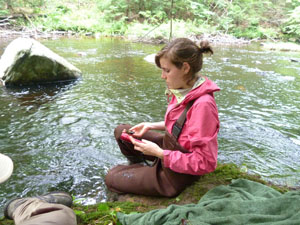Audrey Seiz, Fifth Year Masters
 I began working in the Foster/Baker laboratory during the spring semester of my freshman year (2010). Initially I was involved in collecting data on female threespine stickleback life history traits and also helped with tank and fish maintenance in the laboratory. However, at the end of my freshman Spring semester I was recruited to assist Brittany Laginhas (’10), a senior at the time, with a stream site visit to the East Branch Swift River. Brittany planned to conduct her Masters research on the population distribution and habitat requirements of the freshwater pearl mussel in Massachusetts under the supervision of Professor John Baker. As we waded in the stream searching for mussels and examining the location I felt an instant fascination and connection to the stream system.
I began working in the Foster/Baker laboratory during the spring semester of my freshman year (2010). Initially I was involved in collecting data on female threespine stickleback life history traits and also helped with tank and fish maintenance in the laboratory. However, at the end of my freshman Spring semester I was recruited to assist Brittany Laginhas (’10), a senior at the time, with a stream site visit to the East Branch Swift River. Brittany planned to conduct her Masters research on the population distribution and habitat requirements of the freshwater pearl mussel in Massachusetts under the supervision of Professor John Baker. As we waded in the stream searching for mussels and examining the location I felt an instant fascination and connection to the stream system.
During the Fall semester of my junior year I was accepted to the Semester in Environmental Science in Woods Hole, MA where I was able to conduct a research project in Massachusetts streams. I examined the benthic invertebrate community composition in four streams with varying degrees of restoration intensity to determine if increased restoration intensity more quickly returned streams to their pristine condition. This research experience solidified my interest in streams and provided motivation to develop a Masters thesis studying stream ecology.
Currently I am working on my Masters research, which involves the freshwater pearl mussel, Margaritifera margaritifera. This mussel has predominantly been studied in Europe where it is endangered. In Europe, it was determined that during a crucial phase in its life cycle M. margaritifera is an obligate parasite. After the female mussel’s eggs are fertilized, the larval mussels (glochidia) must be expelled from the female into the stream and inhaled by fish species. The glochidia become encysted on the gills of a salmonid (trout or salmon) where they remain for ten months before dropping off and burying into the substrate. In Massachusetts, unlike streams in Europe, populations of M. margaritifera are abundant. However, the Masters research done by Brittany Laginhas concluded that although mussel populations in Massachusetts stream are common, salmonids are rare. My research seeks to determine if the freshwater pearl mussel is using other fish species as host fish.
In my free time I enjoy reading, hiking and playing tennis. I am also always willing to explore Worcester in search of new restaurants, markets or stores – because who doesn’t love food?
Awards:
- Henry J. Leir Luxembourg Intership with CRP-Gabriel Lippmann: 2014
- Richard P. Traina Scholar: 2009-2013
- Albert, Norma and Howard Geller ’77 Endowed Research Awards: 2013
- LEEP Pioneer: 2012
- NOAA Fellows Program: 2012
Contact Audrey at aseiz@clarku.edu or (207) 210 7782.